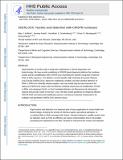SHERLOCK: nucleic acid detection with CRISPR nucleases
Author(s)
Kellner, Max J; Koob, Jeremy G; Gootenberg, Jonathan S; Abudayyeh, Omar O; Zhang, Feng
DownloadAccepted version (1.662Mb)
Publisher Policy
Publisher Policy
Article is made available in accordance with the publisher's policy and may be subject to US copyright law. Please refer to the publisher's site for terms of use.
Terms of use
Metadata
Show full item recordAbstract
© 2019, The Author(s), under exclusive licence to Springer Nature Limited. Rapid detection of nucleic acids is integral to applications in clinical diagnostics and biotechnology. We have recently established a CRISPR-based diagnostic platform that combines nucleic acid pre-amplification with CRISPR–Cas enzymology for specific recognition of desired DNA or RNA sequences. This platform, termed specific high-sensitivity enzymatic reporter unlocking (SHERLOCK), allows multiplexed, portable, and ultra-sensitive detection of RNA or DNA from clinically relevant samples. Here, we provide step-by-step instructions for setting up SHERLOCK assays with recombinase-mediated polymerase pre-amplification of DNA or RNA and subsequent Cas13- or Cas12-mediated detection via fluorescence and colorimetric readouts that provide results in <1 h with a setup time of less than 15 min. We also include guidelines for designing efficient CRISPR RNA (crRNA) and isothermal amplification primers, as well as discuss important considerations for multiplex and quantitative SHERLOCK detection assays.
Date issued
2019Department
McGovern Institute for Brain Research at MIT; Massachusetts Institute of Technology. Department of Brain and Cognitive Sciences; Massachusetts Institute of Technology. Department of Biological EngineeringJournal
Nature Protocols
Publisher
Springer Science and Business Media LLC
Citation
Kellner, Max J, Koob, Jeremy G, Gootenberg, Jonathan S, Abudayyeh, Omar O and Zhang, Feng. 2019. "SHERLOCK: nucleic acid detection with CRISPR nucleases." Nature Protocols, 14 (10).
Version: Author's final manuscript